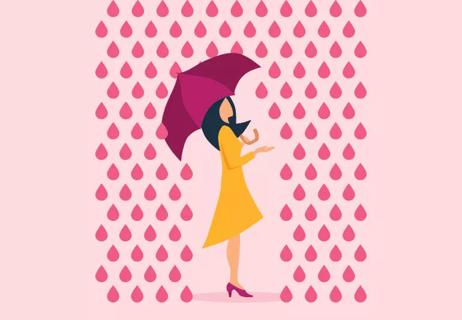Look for signs of an underlying bleeding disorder

As if the raging adolescent hormones aren’t enough, now your daughter has her period. And the bleeding is sort of … heavy. Is this something to worry about?
Advertisement
Cleveland Clinic is a non-profit academic medical center. Advertising on our site helps support our mission. We do not endorse non-Cleveland Clinic products or services. Policy
A heavy period may be just that, or it may be the sign of an undiagnosed bleeding disorder.
In people with bleeding disorders, the blood doesn’t clot as it should. But the signs aren’t always obvious.
“Some girls (and their parents) don’t realize there’s an issue until they start menstruating,” says pediatric hematologist Ravi Talati, DO.
When a young woman starts her period, her hormone systems are still maturing. That means her cycle might be irregular for a couple of years. But even after she matures, what counts as “regular” varies from person to person.
Typically, though, you can expect one period every 28 days or so. It usually lasts about a week. And heavy bleeding generally only occurs in the first few days – not for the entire period.
Your daughter probably doesn’t want to discuss her period with you. (Can you blame her?) But talk to her if you notice that she:
If she does have a bleeding disorder, you might notice these other signs as well:
Advertisement
Some unlucky women just have heavier periods than others. But if you have any concerns, it’s worth taking your teen to see a doctor – even if it means risking some heavy-duty eye rolling.
Von Willebrand disease is the most common bleeding disorder in the U.S. Other, less common bleeding disorders also affect clotting or the function of platelets.
These diseases sound scary — especially when you’re thinking about your own child. In many people, though, symptoms are mild and can be managed effectively, often with medications.
Doctors may prescribe medications such as hormones that can help with symptoms. Talking to a doctor can help get to the bottom of the bleeding so your daughter can get the help she needs.
Heavy periods are definitely not fun. Teens who experience them might avoid activities like swimming or biking with friends. They might feel extra self-conscious about their clothes or embarrassed to carry a purse full of pads everywhere they go.
“The biggest issues for these young women are often quality-of-life challenges,” Dr. Talati says. Luckily, hormonal treatment (like birth control pills) can make periods more manageable — both for young women with bleeding disorders, and those who “just” have heavy periods.
If your adolescent daughter has heavy periods, schedule an appointment with her pediatrician or family physician. If she does have signs of a bleeding disorder, expect a referral to a hematologist. Those specialists can diagnose and manage bleeding disorders — and help your daughter start feeling like herself again.
She might even be glad you started that awkward conversation.
Advertisement
Learn more about our editorial process.
Advertisement

Heat therapy, light exercise and anti-inflammatory medications can bring relief

The research isn’t clear, but it’s safe to try this essential mineral for relief

From medications and stress to PCOS and STIs, there’s a wide range of reasons Aunt Flo may overstay her welcome

Options for relief at any age

It’s important to angle it toward your rectum or back, along the natural curve of your vaginal canal

Yes, you can pee with a tampon in; no, they won’t stretch out your vagina or make cramps worse!

From playful movement to strength-building, kids need exercise to stay healthy and strong

These over-the-counter kits are 99% effective at identifying when you’re most fertile each month

Wearing a scarf, adjusting your outdoor activities and following your asthma treatment plan can help limit breathing problems

Your diet in the weeks, days and hours ahead of your race can power you to the finish line

When someone guilt trips you, they’re using emotionally manipulative behavior to try to get you to act a certain way